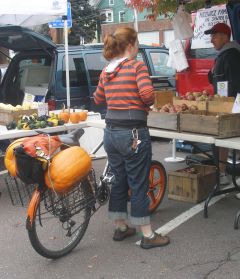October 27, 2007
Autumn at the Agora

Every once in awhile one happens upon a person who is perfectly costumed for the occasion. This is a scene from the autumnal Farmer's Market in Davis Square. Note that our subject has acquired two pumpkins, one for each basket of her orange bicycle, which at another time of year, might seem garish. (Redheads, in my experience, are naturally drawn to orange personal possessions.)
Let's face it, nowadays, Farmer's Markets are the place to see and be seen. They are at the very heart of the Slow Food movement here in the USofA. Wednesday, the public schools were out in full force, showing off their schoolyard gardens, their compost, and their culinary skills. The folks from "Think Outside the Bottle" covered the margins. The rest of us shopped, sampled, sipped, socialized, made cider and dug for earthworms.
Alice Waters of Chez Panisse and The Edible Schoolyard recommends the Farmer's Market highly. Salon interviewed her for her new book "The Art of Simple Foods, in which she makes it clear that food is a political issue for all of us:
I was just thinking about something Brillat-Savarin said. "The destiny of nations depends on how we feed ourselves." That's a really important thing. I want whoever's running for president to say that. The destiny of our nation depends on how we nourish ourselves.
More elaborately from a graduation speech at Mills College:
If you choose to eat mass-produced fast food, you are supporting a network of supply and demand that is destroying local communities and traditional ways of life all over the world—a system that replaces self-sufficiency with dependence. And you are supporting a method of agriculture that is ecologically unsound—that depletes the soil and leaves harmful chemical residues in our food.But if you decide to eat fresh food in season—and only in season—that is locally grown by farmers who take care of the earth, then you are contributing to the health and stability of local agriculture and local communities....
Actions have consequences, and people acting responsibly can make a difference. I believe that how you eat, and how you choose your food, is an act which combines the political—your place in the world of other people—with the most intensely personal—the way you use your mind and your senses, together, for the gratification of your soul. It can change the way we treat each other, and it can change the world.
Meet you at the agora, and be sure to dress accordingly.
Photo note: It's not easy to get a clear shot with all the folks who did not take the time to dress for the occasion milling mindlessly in front of your camera.
Posted by Dakota at October 27, 2007 06:24 AM